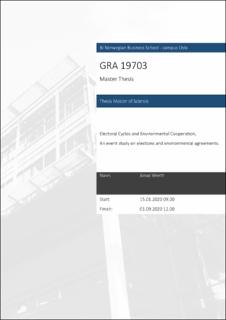Electoral Cycles and Environmental Cooperation, An event study on elections and environmental agreements
Master thesis
Permanent lenke
https://hdl.handle.net/11250/2687463Utgivelsesdato
2020Metadata
Vis full innførselSamlinger
- Master of Science [1621]
Sammendrag
How does political competition impact the ability of countries to successfully coordinate
their trans-national efforts to fight environmental externalities? As the international
community increasingly relies on environmental agreements, it is crucial to explore this
side effect of democratic systems and the implications it has on pressing challenges
like climate change and environmental pollution. In this thesis project, I use multiple
existing data sources to construct a dataset that merges information on the ratification
of environmental agreements, political term lengths, election dates, and party-level data
on environmental preferences for 36 OECD countries between 1975 and 2017. With
this dataset, I perform an event study on the likelihood of ratification before, and after
the election. Furthermore, I investigate if changes in pro-environmentalism between
incumbents and successors foster electoral cycles. I find a significant impact of the
electoral calendar on the likelihood of ratification for environmental agreements. Further,
there is strong evidence that newly elected governments with stronger environmental
preferences drive electoral cycles, but the impact is heterogeneous for different periods
after the election. While newly elected green governments tend to ratify agreements
shortly after the election, reelected incumbents postpone ratification further into the
new term. This study contributes to the research field of environmental economics and
the broader field of political economy by empirically testing for a mechanism through
which electoral competition has negative spillovers on environmental cooperation and the
provision of global public goods. In addition, the dataset can be used as a foundation for
future research on questions surrounding the formation of environmental agreements.
Keywords – International Environmental Agreements, Electoral Cycles, Political
Economy, Event Study, Survival Analysis
Beskrivelse
Masteroppgave(MSc) in Master of Science in Business, Economics - Handelshøyskolen BI, 2020
